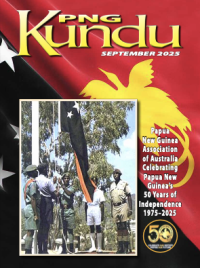PAPUAN CITIZENSHIP
PAPUAN CITIZENSHIP by Laurie Le Fevre
First published in Una Voce, Issue 1, March 2007
A question was raised in the last edition of Una Voce about Papuan citizenship before (or even post) independence and the associated rights and entitlements that were attached to that citizenship.
It is a very broad question for which there is no simple answer, but I will discuss some possibilities.
Papua had been an Australian Territory since 1906; that is, it was not an Australian colony, but an integral part of the Commonwealth of Australia. This was discussed by Ken Humphries’ in his Never a Colony in Una Voce of September 2006.
The Papuan people therefore were Australian citizens by birth, but this was a status most would later lose on independence. Most? Well there were a few Papuan people who retained the right of residence in Australian following independence, e.g. Papuans with an
“Australian” spouse.
Although Papuans were Australian citizens, Papuan residence largely was limited to the territory. Papuans required travel papers (either identity documents or a passport) for movement to Australia. Passports were required for movement beyond Australia, but one
assumes this was a mere technicality to many Papuan people of the Western Province for whom Torres Strait crossings had been a part of their lives for ever.
The question raised in Una Voce about the benefits of Papuans having Australian citizenship is best answered by cataloguing some of the government-provided services to which all benefited.
These included –
- Free health and welfare benefits, including infant, child and maternity services
delivered at village level - Free education, including university education in Australia, Fiji, and in the
Territory of Papua New Guinea - Agricultural extension services
- Business training and development through co-operative societies, business
development programs, and small loans from the Australian Reserve Bank - Preventive medicine programs such as malaria control
- Free legal assistance
- Forestation programs
- Public libraries
- Participation in the political process
- Political education,
- and here’s a long forgotten one the ability to transfer money anywhere in the Territory of Papua New Guinea at no cost to the customer through the Native Monies Trust Account, which was managed largely by the kiaps. No costly banking services or Salim Mani Kwik in those days, but a government-run free service.
At independence Papua New Guinea defined the entitlement to Papua New Guinea citizenship as automatic for persons who had at least two grandparents born in PNG, the Torres Strait Islands, Irian Jaya or the Solomon Islands. This definition would include third generation descendants of people from other countries, for example (but not only) Australia, China, India, Samoa and the UK.
The matter of Papuans losing their Australian citizenship on independence remains a vexed issue on which we will not comment for reasons of editorial policy. However, for members who take an interest in these matters I can advise that on 4 August 2005 the
High Court of Australia upheld the validity of Australian laws which provided that when Papua New Guinea became independent in 1975 its indigenous people who then became citizens of PNG ceased to be citizens of Australia.
The High Court statement dated 4th August 2005 can be provided for information only as a public document and not as legal advice.
In this regard, please note that the views expressed above are general views and do not purport to constitute legal advice. Should anyone have specific enquiries I suggest obtaining legal advice, advice from IMMI, or from an Immigration consultant.
Please refer to the following two articles for additional reading:


